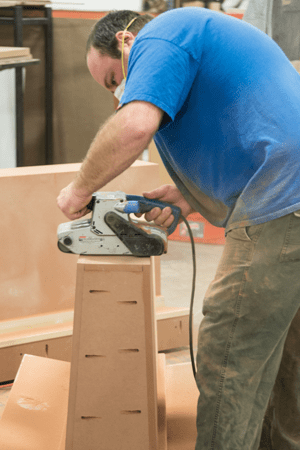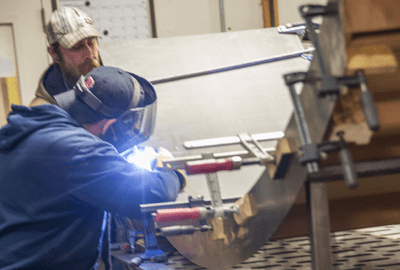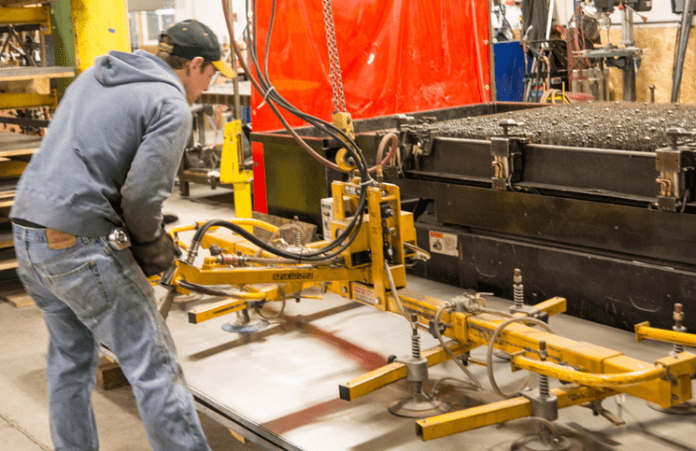Anyone who has walked through an airport in North America recently, whether it was in Portland, Los Angeles or Chicago, has more than likely walked right by a bit of local craftsmanship. Silver Star Industries Inc., headquartered in North Bonneville, specializes in “custom retail fixture production” for airports, shopping malls, luxury retail and free-standing kiosks.
Founded in 1985 by Matt Califf (who still works in the business, along with most of his sons), Silver Star Industries’ first project was for a small local bank, building their counters, check desks and other interior fixtures. 30 years later, the firm has grown from a handful of employees to 130, with an average of 12 percent growth every year for the last 10 years.
Part of that growth, said Bill Skiffington, Silver Star Industries’ operations manager, stems from a contract with the Hudson Group, which is a retailer that operates a chain of newsstands, bookstores, fast food restaurants and other retail stores at airports and train stations in the United States and Canada.
The company started in a 20,000-square-foot facility on the western edge of Skamania County. About 12 years ago, the company moved its headquarters to a 20,000-square-foot building in North Bonneville, while retaining the original Washougal space. Since then, said Skiffington, they have added a second 20,000-square-foot building about one and a half years ago, have leased space from the Port of Skamania in North Bonneville, and just signed another lease for 20,000 square feet in Stevenson – bringing their total space to 100,000 square feet.
 “The new lease is driven by a large project that we’re working on – we just closed the contract in the last month,” said Skiffington. “It will open a lot of doors for us.”
“The new lease is driven by a large project that we’re working on – we just closed the contract in the last month,” said Skiffington. “It will open a lot of doors for us.”
Skiffington said that they have been able to land these large contracts because “we have an amazing team.”
“I really believe we’re one of the fastest in the industry,” stated Skiffington.
Speed, he continued, is vital, because customers are always looking for fast turn-around without loss of quality. He said the industry average for a full-store package (display fixtures for a 1,000- to 2,000-square-foot retail space) is eight to 14 weeks, whereas Silver Star Industries is often able to complete such projects in four to six weeks.
The company uses a single project manager from start to finish. This is not typical for their industry, according to Skiffington. Normally, one person oversees the estimate, another oversees the drafting, and yet another the manufacturing. But at Silver Star Industries, one person is in charge from the first touch with the customer, through the bidding and design/engineering processes to manufacturing and production.
“That adds a lot of efficiency – there are no gaps with re-communication,” said Skiffington.
Using an “excellent dedicated team, focused on getting things done,” helps speed up the process too, as does a well-thought-out layout of equipment in the facility. For example, Skiffington said, the large CNC routers used to be nested squarely into a corner, but now they are angled at 45 degrees, which helps maximize space and improves access to the router tables.
 As another example, he said, they used to have a single big bay door where everything came in and out. In the new North Bonneville building, raw materials are staged at one entrance, the materials move through the CNCs and further processing, and then exit the shipping area at the far end of the building. New loading docks “are a game changer,” added Skiffington, because they eliminate the need for fork lifts.
As another example, he said, they used to have a single big bay door where everything came in and out. In the new North Bonneville building, raw materials are staged at one entrance, the materials move through the CNCs and further processing, and then exit the shipping area at the far end of the building. New loading docks “are a game changer,” added Skiffington, because they eliminate the need for fork lifts.
Another way Silver Star Industries has improved efficiency, said Skiffington, is by bringing as many pieces of the display fixture manufacturing process as possible in-house. For example, the company used to outsource the fabrication and finishing of metal components such as brackets and frames, which could take up to two weeks (plus the expense of driving to Portland). Because retailers are incorporating more metal into their designs, the company needed a “quick turn on small batches.” Doing the work in-house, Skiffington said, has enabled them to complete such projects in 24 hours or less.
Although the focus on speed may conjure up images of an Egyptian slave driver and employees scurrying about in fear, the reality at Silver Star Industries is far different.
“If you walk through the shop – you’ll meet people that feel good about being here. That’s noticeable,” said Skiffington. “Matt (Califf) interacts with the employees on a day-to-day basis, and cares about them. It feels like a family, with a lot of camaraderie, interaction and a feeling of being at home.”
Over the next few years, Skiffington said, the company plans to stabilize growth so that it occurs steadily instead of by “jumps and leaps.”
“We will continue to pare down and identify our core market,” he said. “We need to eliminate fringe projects and aggressively pursue projects that are right in our wheel house.”
The company also intends to continue to explore innovative waste management techniques. They previously had different service providers for different types of waste, but recent changes in service providers has almost doubled the company’s costs for getting rid of garbage, sawdust and waste wood products.
“We’re looking for alternative options,” said Skiffington. “The Wind River Biomass project has potential, and we may be able to partner with them.”
But at the heart of all the company’s plans and growth, he said, is a commitment to make Silver Star Industries a “great place to work.”
“We exist to serve our customers, but we know Silver Star is made of individuals,” Skiffington stated. “We’ve been blessed over the years, and have been given a lot. We feel a responsibility to use that well, not take it for granted.”




